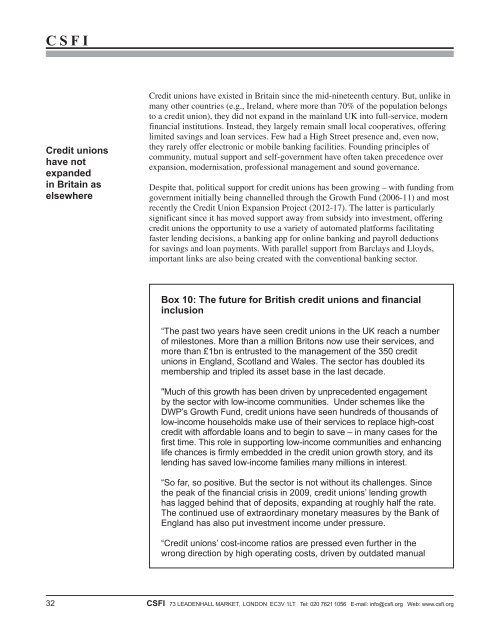CSFI
CSFI+-+Reaching+the+poor+-+release+version
CSFI+-+Reaching+the+poor+-+release+version
You also want an ePaper? Increase the reach of your titles
YUMPU automatically turns print PDFs into web optimized ePapers that Google loves.
<strong>CSFI</strong><br />
Credit unions<br />
have not<br />
expanded<br />
in Britain as<br />
elsewhere<br />
Credit unions have existed in Britain since the mid-nineteenth century. But, unlike in<br />
many other countries (e.g., Ireland, where more than 70% of the population belongs<br />
to a credit union), they did not expand in the mainland UK into full-service, modern<br />
financial institutions. Instead, they largely remain small local cooperatives, offering<br />
limited savings and loan services. Few had a High Street presence and, even now,<br />
they rarely offer electronic or mobile banking facilities. Founding principles of<br />
community, mutual support and self-government have often taken precedence over<br />
expansion, modernisation, professional management and sound governance.<br />
Despite that, political support for credit unions has been growing – with funding from<br />
government initially being channelled through the Growth Fund (2006-11) and most<br />
recently the Credit Union Expansion Project (2012-17). The latter is particularly<br />
significant since it has moved support away from subsidy into investment, offering<br />
credit unions the opportunity to use a variety of automated platforms facilitating<br />
faster lending decisions, a banking app for online banking and payroll deductions<br />
for savings and loan payments. With parallel support from Barclays and Lloyds,<br />
important links are also being created with the conventional banking sector.<br />
Box 10: The future for British credit unions and financial<br />
inclusion<br />
“The past two years have seen credit unions in the UK reach a number<br />
of milestones. More than a million Britons now use their services, and<br />
more than £1bn is entrusted to the management of the 350 credit<br />
unions in England, Scotland and Wales. The sector has doubled its<br />
membership and tripled its asset base in the last decade.<br />
"Much of this growth has been driven by unprecedented engagement<br />
by the sector with low-income communities. Under schemes like the<br />
DWP’s Growth Fund, credit unions have seen hundreds of thousands of<br />
low-income households make use of their services to replace high-cost<br />
credit with affordable loans and to begin to save – in many cases for the<br />
first time. This role in supporting low-income communities and enhancing<br />
life chances is firmly embedded in the credit union growth story, and its<br />
lending has saved low-income families many millions in interest.<br />
“So far, so positive. But the sector is not without its challenges. Since<br />
the peak of the financial crisis in 2009, credit unions’ lending growth<br />
has lagged behind that of deposits, expanding at roughly half the rate.<br />
The continued use of extraordinary monetary measures by the Bank of<br />
England has also put investment income under pressure.<br />
“Credit unions’ cost-income ratios are pressed even further in the<br />
wrong direction by high operating costs, driven by outdated manual<br />
32 <strong>CSFI</strong> 73 LEADENHALL MARKET, LONDON EC3V 1LT Tel: 020 7621 1056 E-mail: info@csfi.org Web: www.csfi.org


